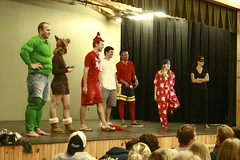The shorter season camps have come to an end, and we asked parents and kids to share with us some of the lessons they learned from their first foray into summer camp.
Martha and Jaden
Martha was born and raised in Peru, and had no childhood experience summer camps. Last year, a family friend sent her child to camp for the first time, so Martha decided to try it this year with her 9 year old son, Jaden. Other kids were talking about summer camp and Jaden was full of questions.
“I didn’t push him to go,” she says, “He was ready to go. Jaden is a child who enjoys everything. He’s a very adaptable kid.” Jaden is a self-described Lego-builder, reader (The Warrior series, currently), and he loves to play Wii. When asked to finish the sentence “Camp is like ___” he had just one word in mind: FUN!
When asked about the funniest thing at camp? “When we were playing waffle ball with shaving cream and we all got covered with it. I looked funny!” he says.
This year Martha chose the 3-week option for Jaden. “I think he could have done the six weeks,” she says, “but for me it was too long. Next year he will go for six weeks.” Martha says camp will make Jaden a better person because he is making friends, having fun, learning new skills, and dealing with emotions like homesickness.
“I learned wakeboarding, tubing, gaga ball, and how to be part of a tribe, which I’d never done before,” Jaden says. “I also learned to be away from home by myself for the first time.”
Martha said the camp’s efforts to keep in touch with her were incredibly helpful in dealing with her own apprehensiveness. The camp sent her frequent updates and she would go online everyday to see the latest photos of camp activities.
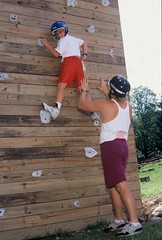 Martha and Jaden also exchanged many letters throughout the summer. In his first letter, Jaden reported that “camp is awesome!” and that he loved the turkey meatballs. Martha loved the correspondence, saying, “Jaden would remember and tell me what I wrote in my letters, and he would tell me things he had done at camp – doing the climbing wall, making friends in the bunk, and so on.”
Martha and Jaden also exchanged many letters throughout the summer. In his first letter, Jaden reported that “camp is awesome!” and that he loved the turkey meatballs. Martha loved the correspondence, saying, “Jaden would remember and tell me what I wrote in my letters, and he would tell me things he had done at camp – doing the climbing wall, making friends in the bunk, and so on.”
The lessons learned from camp go much further though than new sports skills and songs. Martha learned that Jaden is “a strong child and very willing to try new challenges. He has shown me that I underestimate him and I still see him as my baby but I know he can accomplish a lot and can take care of himself and make good choices; and that makes me happy.”
Now that camp is over, Martha says Jaden can’t stop talking about it. “When I went to pick him up he was happy to see me, of course, but he was more excited to show me around camp.” She would ask him if he brushed his teeth and he would answer with a story about something fun at camp. “I wanted to talk about health issues,” she jokes, “he wanted to talk about camp!”
Wendy and Justin
Wendy and Justin live in Florida, so traveling to Pennsylvania for his first year of camp was a big deal for the entire family. Justin had never been away from home for more than two days. “It was scary for me,” Wendy says, “wondering how it was going to be for him.” Not for long though.
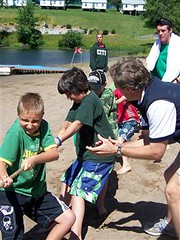 “The camp makes it easy on the parents,” she says now. “They post hundreds of pictures every day.” The first picture she saw of Justin was of him getting off the bus with a huge smile on his face. The next day he was at the lake on the water trampoline. “Those photos are the best way to do start conversations,” she says.
“The camp makes it easy on the parents,” she says now. “They post hundreds of pictures every day.” The first picture she saw of Justin was of him getting off the bus with a huge smile on his face. The next day he was at the lake on the water trampoline. “Those photos are the best way to do start conversations,” she says.
Justin is twelve years old, plays clarinet and baseball, and he loves to bowl. “Camp,” he says, “is like a really long sleepover where you get to have fun, make new friends and try new things.” His favorite part? The evening activities, “because they are always fun and creative.”
Since camp has ended, the conversation has moved back to being in person, but the topic is still camp. “For the first five days after he got home it was non-stop random things about camp,” she says. “I have talked with other mothers and both of them said all the kids could talk about were the fun things they did at camp. But the real happiness and laughter comes from the photos and letting them show you what they did at camp and telling you stories about their life there. The web site helps a lot.”
“Make sure you go to visiting day,” Wendy also advises, “so you can live what they did and so you know the people they know.” This way, when Justin talks about camp experiences, Wendy can really share with him. She has been on the tennis courts, seen the music room, walked to the archery targets and swung the same golf clubs Justin learned on.
“When we sat down to tag all the photos we thought were cool, his were totally different than mine. Things I thought were just nice,” she says, “he thought were the coolest things. Justin would describe people in the pictures as well as all of the activities that he participated in. “He grew up,” she says.
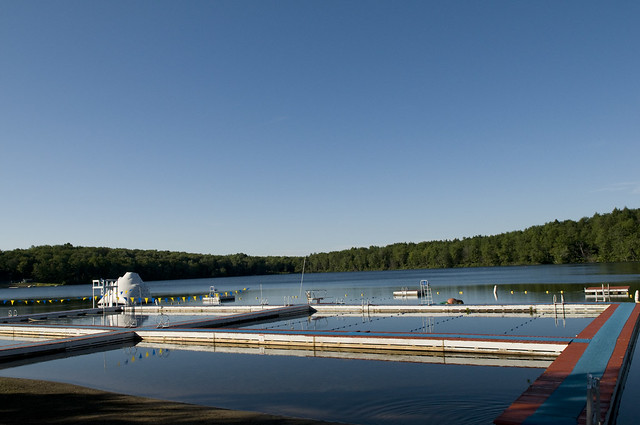
For Wendy, the camp experience was more than she could have imagined. “When you see the video you think it can’t be that good, but then after camp you think the video is not half as good as camp. Camp is 10 times better than the video.”
Both Justin and Jaden attended Camp Weequahic this summer. They have both already made plans with their bunk mates to be back next year. For 6 weeks!

Susan
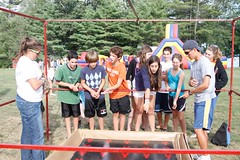 “Camp teaches values such as self-esteem, teamwork, and caring — areas where traditional schools sometimes cause more detriment than good. And camp allows everyone, not just the top student and the best athlete, to thrive and enjoy the process of learning,” says Peg Smith, CEO of the American Camp Association (ACA).
“Camp teaches values such as self-esteem, teamwork, and caring — areas where traditional schools sometimes cause more detriment than good. And camp allows everyone, not just the top student and the best athlete, to thrive and enjoy the process of learning,” says Peg Smith, CEO of the American Camp Association (ACA).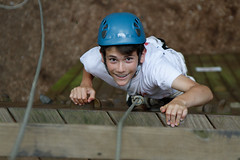
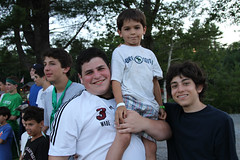


 570-798-9831
570-798-9831




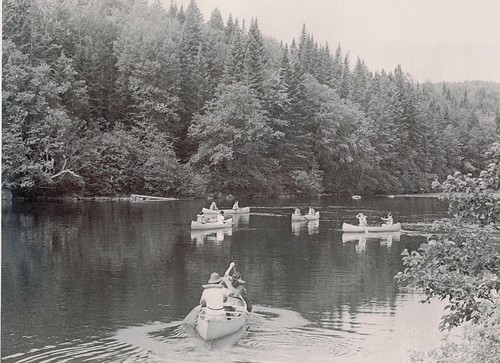
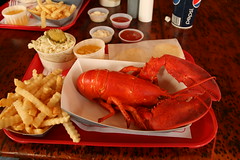 Laurel also hosts College Days and Lobster and Steak/Final Ceremony. College Days (which lasts five days!) is Laurel’s answer to the camp color war and includes spirit, fun, games, tug ‘o war, swim meets, track meets, staff competitions, Apache relays, silent meals, treasure hunts, dance competitions and much more. Laurel finishes camp with a flourish by hosting a meal with lobster direct from the sea. After all, who could come to camp in Maine and not love lobster? The campers finish their summer with speeches, traditional songs and a night sleeping under the stars.
Laurel also hosts College Days and Lobster and Steak/Final Ceremony. College Days (which lasts five days!) is Laurel’s answer to the camp color war and includes spirit, fun, games, tug ‘o war, swim meets, track meets, staff competitions, Apache relays, silent meals, treasure hunts, dance competitions and much more. Laurel finishes camp with a flourish by hosting a meal with lobster direct from the sea. After all, who could come to camp in Maine and not love lobster? The campers finish their summer with speeches, traditional songs and a night sleeping under the stars. Martha and Jaden also exchanged many letters throughout the summer. In his first letter, Jaden reported that “camp is awesome!” and that he loved the turkey meatballs. Martha loved the correspondence, saying, “Jaden would remember and tell me what I wrote in my letters, and he would tell me things he had done at camp – doing the climbing wall, making friends in the bunk, and so on.”
Martha and Jaden also exchanged many letters throughout the summer. In his first letter, Jaden reported that “camp is awesome!” and that he loved the turkey meatballs. Martha loved the correspondence, saying, “Jaden would remember and tell me what I wrote in my letters, and he would tell me things he had done at camp – doing the climbing wall, making friends in the bunk, and so on.” “The camp makes it easy on the parents,” she says now. “They post hundreds of pictures every day.” The first picture she saw of Justin was of him getting off the bus with a huge smile on his face. The next day he was at the lake on the water trampoline. “Those photos are the best way to do start conversations,” she says.
“The camp makes it easy on the parents,” she says now. “They post hundreds of pictures every day.” The first picture she saw of Justin was of him getting off the bus with a huge smile on his face. The next day he was at the lake on the water trampoline. “Those photos are the best way to do start conversations,” she says.
 The AFSC family of camps each have their own special camp traditions that bring the entire camp together for friendly competition, unique bonding activities, wonderful gourmet treats, and a chance to show off talents and teamwork. Here’s a quick summary of each for you but be sure to check out the Camp web sites linked here!
The AFSC family of camps each have their own special camp traditions that bring the entire camp together for friendly competition, unique bonding activities, wonderful gourmet treats, and a chance to show off talents and teamwork. Here’s a quick summary of each for you but be sure to check out the Camp web sites linked here!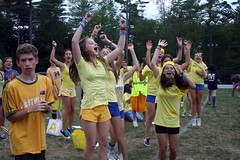

 As we said earlier, every camp has a take on the camp stand-by, the color war, and at
As we said earlier, every camp has a take on the camp stand-by, the color war, and at  A camp counselor’s day begins bright and early, when the campers wake up. They get up with the kids, get dressed, share breakfast together and motivate the campers to start their day. Cabin counselors for the youngest campers (grades 1-5) stay with them throughout the day, like a big brother or sister, ushering them through their daily routine of activities, meals and field trips. Campers develop close relationships with their counselors over the summer, and the counselors take on the roles of surrogate parent, mentor, leader, role model, and friend. The counselors work hard to maintain a great relationship with campers (Read more
A camp counselor’s day begins bright and early, when the campers wake up. They get up with the kids, get dressed, share breakfast together and motivate the campers to start their day. Cabin counselors for the youngest campers (grades 1-5) stay with them throughout the day, like a big brother or sister, ushering them through their daily routine of activities, meals and field trips. Campers develop close relationships with their counselors over the summer, and the counselors take on the roles of surrogate parent, mentor, leader, role model, and friend. The counselors work hard to maintain a great relationship with campers (Read more 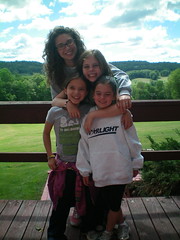 Knee began his camping career as a camper 14 years ago. He is now the person responsible for building the counselor-in-transition program – grooming the eldest campers to be the counselors of tomorrow. Regardless of what camp your child attends, if they are interested in one day being a counselor, they will probably need to complete some sort of transition program like the one David runs at Starlight.
Knee began his camping career as a camper 14 years ago. He is now the person responsible for building the counselor-in-transition program – grooming the eldest campers to be the counselors of tomorrow. Regardless of what camp your child attends, if they are interested in one day being a counselor, they will probably need to complete some sort of transition program like the one David runs at Starlight.
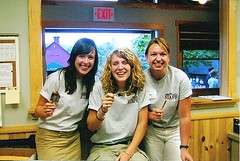 The counselors, who have the most direct contact with your camper, have all completed at least their first year of college (with many further on), and go through a rigorous interview and selection process, and reference and background checks. AFSC camps recruit counselors from over 100 different colleges around the country and many fine universities throughout the world. Just over half of the counselors return from year to year, with many only ending their counseling careers when they graduate college and move on to real-world schedules (no more free summers!)
The counselors, who have the most direct contact with your camper, have all completed at least their first year of college (with many further on), and go through a rigorous interview and selection process, and reference and background checks. AFSC camps recruit counselors from over 100 different colleges around the country and many fine universities throughout the world. Just over half of the counselors return from year to year, with many only ending their counseling careers when they graduate college and move on to real-world schedules (no more free summers!)